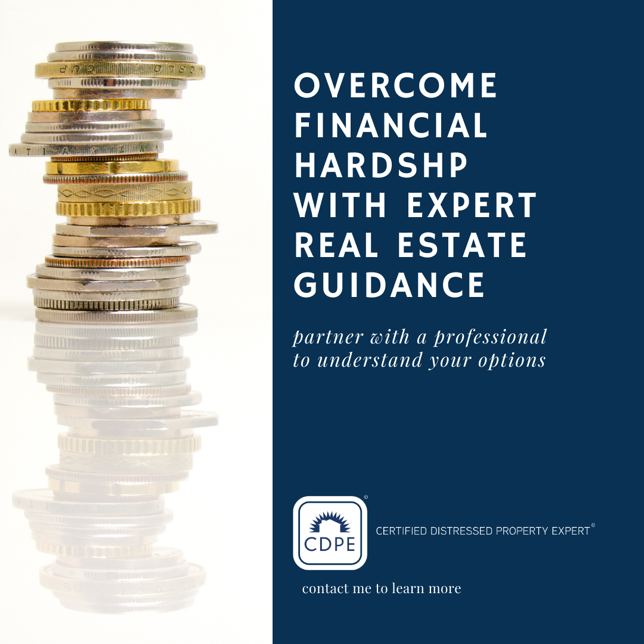In my years of experience as a Certified Distressed Property Expert, I’ve encountered numerous families facing the daunting prospect of financial hardship. The stress of managing real estate commitments during such times can feel insurmountable. However, with the right guidance and strategies, I’ve seen many turn their situations from despair to hope and stability.
Understanding the Landscape of Financial Distress
The first step in navigating financial hardship is recognizing the signs. These can range from struggling to meet monthly mortgage payments to increasing reliance on credit for daily expenses. The earlier these signs are identified; the more options are available to mitigate the situation. Economic fluctuations also play a significant role, impacting property values and influencing decisions on whether to hold or sell assets.
Strategic Options for Managing Real Estate
Here are some strategies that have proven effective:
- Refinancing Your Mortgage: This can reduce your monthly payments and potentially lower your interest rate, making your financial obligations more manageable. It’s crucial, however, to consider the costs involved and assess whether the long-term savings justify these expenses.
- Loan Modification: Unlike refinancing, a loan modification alters the terms of your existing mortgage to lower your monthly payments. This can be a lifeline for those who may not qualify for refinancing due to credit issues or decreased home value.
- Selling Your Home: If the financial strain is too great, selling might be the best option. Whether through a traditional sale, a short sale, or instant cash offers, each method has its benefits and considerations depending on your urgency and financial condition.
Legal Considerations and Tax Implications
Navigating the legal landscape and understanding the tax implications of your decisions are crucial. For instance, the process of foreclosure and alternatives like a deed-in-lieu of foreclosure can have significant legal and financial outcomes. Similarly, the tax repercussions of a distressed property sale can be substantial. Each decision should be made with a full understanding of these implications to avoid future liabilities.
Rebuilding Your Financial Foundation
Once immediate real estate concerns are addressed, it’s vital to focus on rebuilding your financial stability. This includes repairing credit, managing debt effectively, and strategically planning future real estate investments to avoid previous pitfalls. Stability in your financial and real estate affairs is not only about recovery but also about preparing for future growth.
Common Pitfalls to Avoid
Many homeowners exacerbate their financial difficulties by making several common mistakes:
- Ignoring Early Warning Signs: Often, homeowners hope that financial troubles will resolve themselves. This delay can limit available options and lead to more drastic measures such as foreclosure.
- Draining Retirement Funds: Using retirement savings to cover mortgage payments should be a last resort. It comes with heavy penalties and taxes and sacrifices long-term security for short-term relief.
- Rejecting Professional Advice: Navigating financial hardship requires specific knowledge about real estate and finance. Professional guidance can help explore all possible options and choose the best course of action based on comprehensive analysis and experience.
A Real-Life Success Story
Let me share a success story: Maria, a client, faced foreclosure after her husband lost his job. Overwhelmed by mounting bills and a declining income, they were on the brink of losing their home. After consulting with me, we decided that a loan modification was the best approach. We worked with the lender to reduce the monthly payments and interest rate, allowing Maria and her family to retain their home and regain financial control.
The Importance of Expert Guidance
Facing these challenges alone can be daunting and risky. As a Certified Distressed Property Expert, I have the training and resources to help homeowners navigate through these tough times effectively. My role is to provide not just solutions but also education on how to handle real estate challenges in the face of financial distress.
Conclusion and Call to Action
Navigating through real estate challenges during financial hardship doesn’t have to be a journey you take alone. There are pathways to stability and solutions tailored to your unique situation. If you’re experiencing financial hardship, don’t wait. Contact me today to discuss your options and start your journey from hardship to hope. I invite you to download my free guide, “From Hardship to Hope: A Guide to Managing Real Estate in Tough Times,” which provides further insights and strategies for managing your real estate challenges. Let’s work together to transform your current challenges into opportunities for stability and growth.
For more detailed guidance and personalized assistance, I encourage you to download our free guide on effective communication with your lender during financial hardship. Download your free guide here.
Stay proactive and reach out for help today—you don’t have to face this challenge alone.
For more information on this topic or other real estate topics, please contact Cindy Warner at [email protected].
Disclaimer: This report is intended for informational purposes only and should not be considered as legal or financial advice. It is advisable to consult with a qualified real estate professional or financial advisor before making any decisions related to your distressed property.
